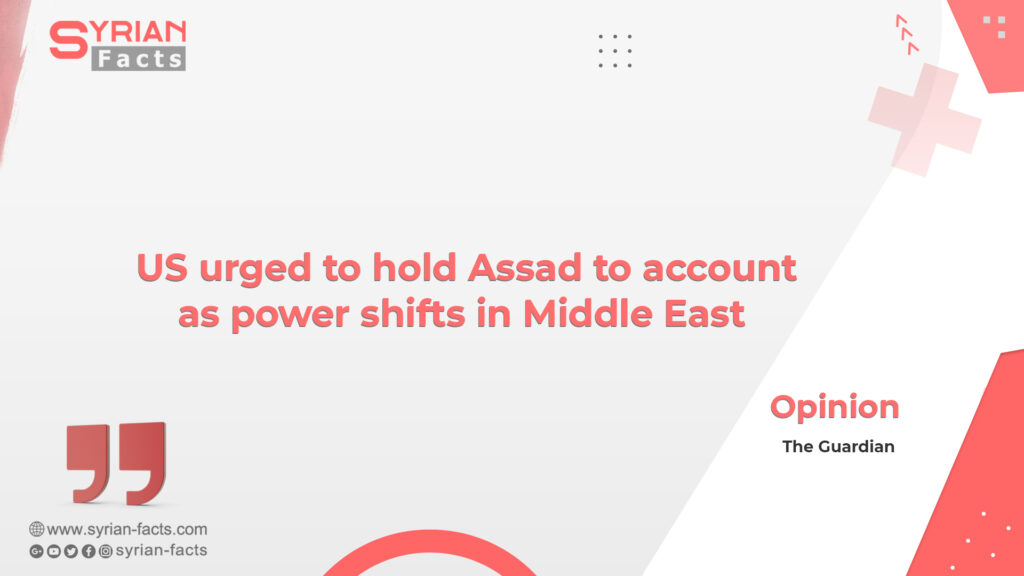US urged to hold Assad to account as power shifts in Middle East
Officials call on Biden to take steps to stop Arab states from normalising relations with Syrian leader
Martin Chulov Middle East correspondent
Mon 27 Mar 2023 19.01 BST
Moves to re-engage Bashar al-Assad without him taking steps to stabilise Syria or commit to reforms should be met by more robust US leadership that holds the Syrian leader to account and addresses a litany of US policy failings, a group of prominent former officials say.
In an unprecedented letter to Joe Biden and the secretary of state, Antony Blinken, the officials called for moves to stop a regional drift towards normalisation with Assad and impose a formalised ceasefire that facilitates a more impactful aid effort and helps ignite a political process.
The appeal follows moves by the UAE to normalise relations with Assad, which are likely to be followed by other Arab states. Saudi Arabia on Friday flagged that it may follow suit, after a highly public state visit by the Syrian leader to Abu Dhabi earlier this month in which a 21-gun salute and a motorcade appeared to herald his official reappearance on an Arab stage, after being treated as an outcast for nearly 12 years.
Signatories to the letter include a former CIA director, John McLaughlin, the most senior US official to work on Syria since 2011; James Jeffrey, a former US special envoy for Syria; retired Mne Corp General Anthony Zinni; and Mouaz Moustafa, executive director of the Syrian Emergency Task Force – as well as civil society activists at the forefront of efforts to highlight crimes against humanity committed by the Assad regime.
Syrian leader Bashar al-Assad during the 2021 presidential elections
Bashar al-Assad seizes his chance for a comeback after Syrian earthquake
Read more
The regional moves to re-engage Assad have sparked alarm in parts of the Biden administration and in Europe, where steps are under way to prosecute low-level regime officials for war crimes. Investigators have been gathering material that could place more senior officials in the crosshairs of international prosecutors.
Of particular concern is how to stabilise areas that remain outside the control of the central government, which are heavily dependent on aid, susceptible to local power bases and at the whim of neighbouring states. Assad has been unwilling to meaningfully reconcile with such areas, primarily in northern Syria.
“None of the issues that caused the Syria conflict have been resolved, most notably Assad regime atrocities and inability or refusal to reform,” the letter says. “Many of the conflict’s symptoms are worsening, from human suffering, industrial-scale drug trafficking, refugee flows, terrorism, geopolitical conflict and ethnic and sectarian hostilities.
“The Biden administration’s foreign policy priorities of great power competition, international and Middle East stability, human rights, humanitarianism, or combating food insecurity are insufficiently advanced through the current Syria policy.
“Piecemeal normalisation efforts by some regional governments do not address US national security interests or human rights issues, and they erode the international community’s capacity to shape a political process aimed at meaningfully resolving the crisis.”
The letter calls for a ceasefire to be formalised as a first step, and guaranteed by “external stakeholders”. Such a move would almost certainly require the input of a US administration that has disengaged from the Middle East and is focusing much of its foreign policy energies on Ukraine.
Charles Lister, director of the Syria and countering terrorism and extremism programmes at the Middle East Institute, said: “For regional states re-engaging Assad’s regime, the calculus is driven by a simple fact: the US and allies are nowhere to be seen. Their Syria policy is impotent and indifferent, and with that, the regime is not only going nowhere, it’s being granted an unchallenged victory.
“If we create a vacuum, someone’s going to step into it; if we show no serious interest in pushing determinedly for justice and accountability, why should regional states?”
Meanwhile, regional moves to engage Assad are accelerating. “The logic behind it all has to do with the new realisation that the Syrian regime is here to stay,” said Prof Abdulkhaleq Abdulla, a prominent UAE scholar. “The UAE tried everything possible, militarily, diplomatically, economically, over the past 10 years to help the Syrians topple this regime.
“Reality on the ground says we need to engage him. Short of dismantling him, real politics requires that you talk and re-engage. This is a fundamental departure from the past. We all know that he is not a good person, that he has killed many of his people, that he has committed war crimes and did so many outrageous things and probably still does. But morality is something and politics is something else.”
He added: “This is also part of the policy of reaching out to adversaries over the last 10 years. Turkey, Iran, Qatar, Israel and Syria fall into that. They are asking him to be receptive to a few more possible outcomes. Caring for the nearly 12 million Syrian refugees in Lebanon, for example. More Arab presence probably will transfer in to less Iranian presence. Not total Syrian disengagement to Iran, that’s not feasible. But more Arab presence in Damascus will likely translate into less Iranian presence.
“I know we differ with our American and European friends on this. We have our own way of thinking. This is an Arab case. But I think they will eventually realise the realities on the ground. Bulldozers sometimes take the brunt and the criticism, but that’s the role the UAE is playing these days.”
… as 2023 gathers pace, and you’re joining us from Turkey, we have a small favour to ask. A new year means new opportunities, and we’re hoping this year gives rise to some much-needed stability and progress. Whatever happens, the Guardian will be there, providing clarity and fearless, independent reporting from around the world, 24/7.
Times are tough, and we know not everyone is in a position to pay for news. But as we’re reader-funded, we rely on the ongoing generosity of those who can afford it. This vital support means millions can continue to read reliable reporting on the events shaping our world. Will you invest in the Guardian this year?
Unlike many others, we have no billionaire owner, meaning we can fearlessly chase the truth and report it with integrity. 2023 will be no different; we will work with trademark determination and passion to bring you journalism that’s always free from commercial or political interference. No one edits our editor or diverts our attention from what’s most important.
With your support, we’ll continue to keep Guardian journalism open and free for everyone to read. When access to information is made equal, greater numbers of people can understand global events and their impact on people and communities. Together, we can demand better from the powerful and fight for democracy.
Whether you give a little or a lot, your funding is vital in powering our reporting for years to come.









Be the first to write a comment.